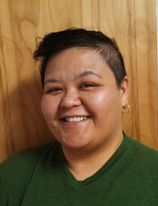Equity and Inclusion Workshops
Equity and Inclusion Workshops

Track Description/Goals:
Putting equity at the center requires each of us to constantly ‘do our work’ - the work of seeing the barriers to true meritocracy; the work of putting ourselves in the shoes of traditionally marginalized voices to learn more about experiences and perceptions; the work of understanding how our biases shape our worldview and self-perceptions; and the work of gaining the skills of deciphering and managing cross-racial and cultural dynamics. That’s a lot of work, but without it none of us can create fundamental change in our spheres of influence. These workshops open a discussion beyond what it means to be ‘good people’ and starts by trying to be real people. We discussed personal, interpersonal and institutional practices that we can all explore in our community work. Although participants are encouraged to attend both workshops, they were designed to stand alone.
Track Leader/Trainer: Ita Meno, CQ Strategies
A baker, gardener, activist, trainer and health/housing inspector, Ita has engaged the community in dialogue and activity. In addition to having worked many with non-profits as a volunteer or trainer, Ita has been an activist with the Radical Cheerleaders, is a member of Kings Local 802, and is a founding member of the House of Lordes, both activist-oriented drag performance groups. As a training partner of CQ Strategies, a cultural-competency consulting company, Ita continues to work with non-profits, local companies and government agencies to understand the impact of personal identities on the community. Ita can often be seen traipsing about town with the family, talking and laughing, interrupting hurtful remarks and breaking up fights.
For more information, or to reach out, contact Ita at: [email protected] or visit our website at www.cqstrategies.org
Putting equity at the center requires each of us to constantly ‘do our work’ - the work of seeing the barriers to true meritocracy; the work of putting ourselves in the shoes of traditionally marginalized voices to learn more about experiences and perceptions; the work of understanding how our biases shape our worldview and self-perceptions; and the work of gaining the skills of deciphering and managing cross-racial and cultural dynamics. That’s a lot of work, but without it none of us can create fundamental change in our spheres of influence. These workshops open a discussion beyond what it means to be ‘good people’ and starts by trying to be real people. We discussed personal, interpersonal and institutional practices that we can all explore in our community work. Although participants are encouraged to attend both workshops, they were designed to stand alone.
Track Leader/Trainer: Ita Meno, CQ Strategies
A baker, gardener, activist, trainer and health/housing inspector, Ita has engaged the community in dialogue and activity. In addition to having worked many with non-profits as a volunteer or trainer, Ita has been an activist with the Radical Cheerleaders, is a member of Kings Local 802, and is a founding member of the House of Lordes, both activist-oriented drag performance groups. As a training partner of CQ Strategies, a cultural-competency consulting company, Ita continues to work with non-profits, local companies and government agencies to understand the impact of personal identities on the community. Ita can often be seen traipsing about town with the family, talking and laughing, interrupting hurtful remarks and breaking up fights.
For more information, or to reach out, contact Ita at: [email protected] or visit our website at www.cqstrategies.org
Morning Workshop - 10:20AM - Noon
Knowledge Isn’t Understanding: Implicit Bias, Microaggressions and Fragility in the Movement
This beginner level session will introduce concepts of Implicit Bias, Micromessaging and White Fragility and start the conversation about how our bias interferes with intelligent and equitable movement building.
Participants will have opportunities to analyze micromessages by identifying implicit (unconscious) bias. Concepts of implicit and explicit bias serve as a focal point as we move through this session. We examine differences between intent and impact, and what those differences mean for building authentic relationships through organizing. With any time remaining, participants will spend time exploring institutional forms of bias relating to power, intersectionality, and advantage within their organizational culture.
Knowledge Isn’t Understanding: Implicit Bias, Microaggressions and Fragility in the Movement
This beginner level session will introduce concepts of Implicit Bias, Micromessaging and White Fragility and start the conversation about how our bias interferes with intelligent and equitable movement building.
Participants will have opportunities to analyze micromessages by identifying implicit (unconscious) bias. Concepts of implicit and explicit bias serve as a focal point as we move through this session. We examine differences between intent and impact, and what those differences mean for building authentic relationships through organizing. With any time remaining, participants will spend time exploring institutional forms of bias relating to power, intersectionality, and advantage within their organizational culture.
Afternoon Workshop: 1:30PM - 3:00PM
How Do We Even Start?: Decolonizing the Green Movement When Love Isn't Actually Enough
Empathy and compassion are important elements in community building, but these will do little without constant vigilance towards dismantling systems that collude to oppression. Building on concepts introduced in the morning session, this beginner/early intermediate session will explore the systems in which we organize. Using examples provided during the session, we will explore forms of unconscious bias relating to power, intersectionality and leadership.
How Do We Even Start?: Decolonizing the Green Movement When Love Isn't Actually Enough
Empathy and compassion are important elements in community building, but these will do little without constant vigilance towards dismantling systems that collude to oppression. Building on concepts introduced in the morning session, this beginner/early intermediate session will explore the systems in which we organize. Using examples provided during the session, we will explore forms of unconscious bias relating to power, intersectionality and leadership.
